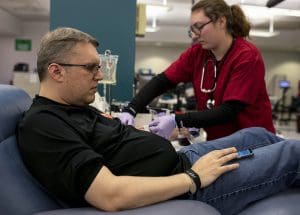FDA still banning some gay men from donating blood despite urgent need
Despite a desperate need for donations amid the outbreak, the agency is still refusing blood from certain men regardless of their HIV risk.

The Food and Drug Administration revised its ban on gay and bisexual men donating blood, plasma, and platelets on Thursday, but left in place a prohibition on donations from any man who has had sex with another man within the three months prior to the given donation date.
With the COVID-19 pandemic and resulting social distancing measures, many blood drives have been canceled, causing what the agency called “unprecedented challenges to the U.S. blood supply.”
The revision updates a previous policy that required a full year of abstinence from gay and bisexual men. The new three-month rule also applies to women who have sex with a man who has had sex with another man, as well as to people who recently got piercings or tattoos.
In a statement, FDA Center for Biologics Evaluation and Research director Peter Marks said the guidance was for “immediate implementation to address the urgent and immediate need for blood and blood components.”
Last week, a group of 17 Senate Democrats urged the FDA to lift the ban entirely, saying that this is the time “to shift away from antiquated and stigmatizing donation policies to ones that are scientifically sound, based on individual risk, and inclusive of all potential healthy blood donors.”
The senators noted that “with important advances in blood screening and safety technology, a time-based deferral policy is not scientifically sound, continues to effectively exclude many healthy gay and bisexual men, and does not meet the urgent demands of the moment,” and that “with the increased uptake of Pre-Exposure Prophylaxis (PrEP), which reduces the likelihood that an HIV-negative individual will acquire HIV, many more gay and bisexual men are aware of their HIV-negative status and are taking steps to effectively eliminate their personal risk of HIV transmission.”
GLAAD, a national LGBTQ advocacy group that is advocating for ending the prohibition, on Thursday called the change an “imperfect” victory, promising to “keep pushing for the ban to be lifted entirely.”
The ban on blood donation by men who have sex with men was initially put in place in the 1980s as a way to curb the transmission of HIV through blood transfusions. The policy prohibited any blood donations from those men for life.
In 2015, the FDA changed the ban to a one-year abstinence requirement.
Beyond the typical need for blood donations, scientists are currently exploring whether plasma donations from recovered COVID-19 patients can be used to help those currently infected. Gay and bisexual men who recover from COVID-19 still must follow the donation guidelines, making many potential donors ineligible.
As of Thursday, the CDC has recorded at least 213,144 confirmed and presumptive COVID-19 cases and more than 4,500 deaths from the disease in the United States.
Published with permission of The American Independent Foundation.
Recommended

Biden campaign launches new ad focused on Affordable Care Act
Former President Trump has said he wants to do away with the popular health care law.
By Kim Lyons, Pennsylvania Capital-Star - May 08, 2024
Ohio doctors fear effects of emergency abortion care case set to go before U.S. Supreme Court
A federal law that allows emergency departments to treat patients without regard to their ability to pay will be under U.S. Supreme Court scrutiny this week, and Ohio doctors are concerned about the case’s local impact on emergency abortion care.
By Susan Tebben, Ohio Capital Journal - April 23, 2024
House GOP votes to end flu, whooping cough vaccine rules for foster and adoptive families
A bill to eliminate flu and whooping cough vaccine requirements for adoptive and foster families caring for babies and medically fragile kids is heading to the governor’s desk.
By Anita Wadhwani, Tennessee Lookout - March 26, 2024














































































